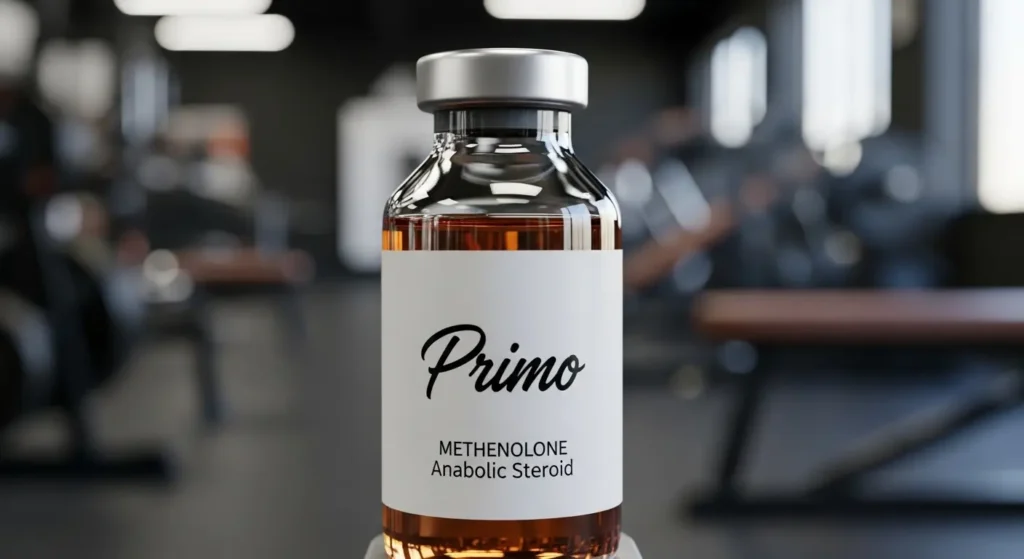Worried that Primo (Primobolan) might be triggering unwanted hair loss? The big question many ask is: Does Primo cause hair loss, and if so, how serious is the risk?
In this article, we’ll break down the science behind how Primo affects your hair, compare expert and user reports, and share practical strategies to protect your hair health.
By the end, you’ll have the clarity you need to make informed choices, whether you’re considering Primo or looking for ways to reduce its side effects.
What Is Primo (Primobolan)?

Overview of Methenolone / Primobolan
Primo, short for Primobolan, is the brand name for Methenolone, an anabolic steroid. It’s available in two forms:
- Oral tablets (Methenolone acetate)
- Injectable form (Methenolone enanthate)
Unlike more aggressive steroids, Primo is often considered “mild” because it is less androgenic.
Why It’s Popular
Athletes and bodybuilders favor Primo for:
- Lean, dry muscle gains without excessive water retention
- Low estrogenic activity (minimal risk of gynecomastia)
- Reputation for fewer side effects compared to stronger compounds like Trenbolone
However, “mild” does not mean free from risks—especially when it comes to hair health.
How Steroids Can Cause Hair Loss
Mechanisms: DHT, Androgen Receptor Sensitivity, Follicle Miniaturization
Many anabolic steroids are derived from Dihydrotestosterone (DHT), a potent androgen. DHT attaches to androgen receptors in hair follicles, shortening their growth phase and leading to follicle miniaturization. Over time, this results in thinner, weaker hairs.
Role of Genetic Predisposition
If you carry genes for male pattern baldness (androgenetic alopecia), DHT exposure accelerates the process. Even a “milder” steroid like Primo can worsen hair loss if you are genetically sensitive.
Does Primo Actually Cause Hair Loss? What Does the Evidence Say?
Scientific and Medical Consensus
Primo is a DHT derivative, meaning it can bind strongly to androgen receptors in hair follicles. While it does not aromatize (convert to estrogen), its androgenic properties can accelerate hair shedding in predisposed individuals.
Expert Opinions
According to dermatology and endocrinology experts, the risk is dose-dependent and highly individualized. Some tolerate Primo well, while others notice shedding within weeks.
Comparative Risk vs Other Steroids
- Primo vs Masteron: Both are DHT-based, but Masteron is considered harsher.
- Primo vs Testosterone: Some experts argue that hair loss attributed to Primo may actually result from the Testosterone used alongside it in cycles.
- Primo vs Trenbolone: Trenbolone is significantly more androgenic and damaging to hair than Primo.
In short, Primo can cause hair loss, but the risk varies depending on genetics, dose, and stacking.
User & Community Reports
Anecdotal Experiences
Online forums and Reddit threads offer a range of experiences:
- “Primo is terrible if you suffer from MPB… it accelerates thinning.”
- “Primo is not the worst, but it’s not innocuous either.”
- “Everyone who claims Primo caused hair loss was also on Test—usually the Test is the main culprit.”
Variability in Responses
Some users experience aggressive shedding, while others report no noticeable changes. The variation highlights that individual sensitivity matters most.
Factors That Influence Hair Loss Risk with Primo
- Dosage and Duration: Higher doses and longer cycles increase risk.
- Stacking with Other Compounds: Adding Testosterone or harsher steroids worsens shedding.
- Individual Sensitivity: Genetic predisposition determines whether you’ll shed or not.
- Age and Hairline History: Older individuals or those with receding hairlines face a greater risk.
Mitigation Strategies: Minimizing Hair Loss Risk
Use of Anti-Androgens or DHT Blockers
- Finasteride: Blocks the conversion of Testosterone to DHT, but may not fully protect against DHT derivatives like Primo.
- Saw Palmetto: A natural, weaker DHT blocker.
Topical Treatments
- Minoxidil (Rogaine): Promotes regrowth and thickening.
- Ketoconazole Shampoo: Reduces scalp inflammation and may lower local DHT activity.
Lifestyle Factors
- Ensure balanced nutrition with adequate protein, zinc, and vitamin D.
- Manage stress, as cortisol can worsen shedding.
- Avoid excessive heat styling or chemical treatments that stress follicles.

Importance of Medical Supervision
Before starting or continuing a steroid cycle, seek professional guidance. Bloodwork and scalp assessments help detect early signs of androgenic stress.
FAQs
Does Primo always cause hair loss?
Is hair loss from Primo reversible?
Can low doses prevent hair loss?
Are there safer alternatives to Primo?
When should I see a specialist?
Conclusion
So, does Primo cause hair loss? The answer is yes, it can, especially in genetically sensitive individuals. While Primo is often considered “milder” than other steroids, its DHT-based structure still poses real risks to hair health. Understanding the mechanisms, monitoring your body, and applying prevention strategies are essential for protecting your hair while making informed choices.
Concerned about hair loss linked to steroid use? Don’t wait until thinning becomes permanent. Book a consultation with Dr. Rana Irfan in Islamabad today to assess your scalp health, explore advanced hair restoration solutions, and get personalized advice from one of Pakistan’s leading ABHRS-certified specialists.
